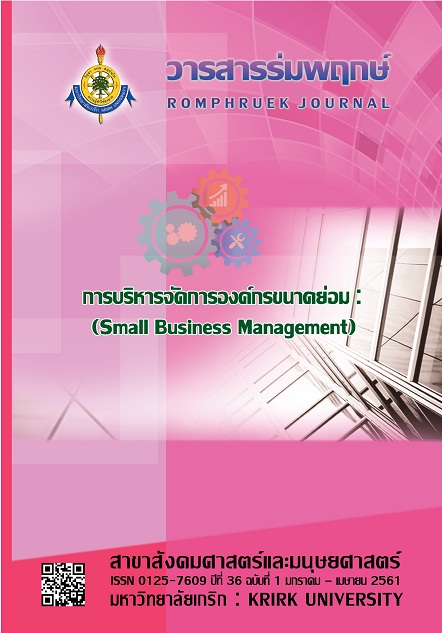The Way to Promote Ethics for Thai Media Using Buddhist Integration
Main Article Content
Abstract
Thai society has been stepping up its calls for mass media to demonstrate greater ethics, after new-style investors enter mass-media industry with a focus on profits rather than public interests. Having the objective of promoting media ethics, this research identified four ethical problems in mass media. They were 1) unethical news presentation; 2) unethical media investors; 3) problems related to knowledge and understanding of mass-media ethics; and 4) problems in media-ethic regulatory system. These issues were studied to develop ethical guideline for mass media. According to findings, five Buddhist concepts can be integrated to the guideline namely Conscientiousness, Four Prejudices, Five Precepts and Five Dharma Components, the Right Livelihood, and Three-Fold Training. The integrated guideline features: 1) unbiased presentation of facts; 2) separation of facts and opinions; 3) fair and balanced coverage; 4) focus on public interests; 5) respect for privacy and human dignity; 6) ban on obscene or lewd photos; 7) ban on hate speeches; 8) ban on bribery; and 9) ban on veiled advertisements. Through the integration of Buddhist concepts into mass-media ethics, this research presented “Buddhist Ethics of Mass Media” so as to provide more sustainable solutions to ethical issues. To follow the guideline, mass-media members should persevere in improving their mind and actions; speak of ethics to foster conscientiousness; feel ashamed of unethical thoughts, words and acts; strive to present accurate, transparent, unbiased and fair reports; focus on public interests; uphold mass-media spirit, and fully comply with media ethics on a sustainable basis.
Article Details
Every article published in the Romphruek Journal of the Humanities and Social Sciences is the opinion and point of view of the authors. Thery're not the viewpoint of Krirk University or the editored department. Any part or all of the articles for pablication must be clearly cited.
References
ชวรงค์ ลิมป์ปัทมปาณี, ประธานสภาการหนังสือพิมพ์แห่งชาติและผู้บริหารนสพ.ไทยรัฐ. สัมภาษณ์, 19 เมษายน 2560.
ชัยฤทธิ์ ยนเปี่ยม. (2560). กม.กำกับจริยธรรม-รู้เท่าทันสื่อ การปฏิรูปจึงจะสำเร็จ สื่อมืออาชีพในภูมิทัศน์ใหม่ 5 มีนาคม วันนักข่าว. 94.
ชัยฤทธิ์ ยนเปี่ยม. บรรณาธิการข่าวการเมือง หนังสือพิมพ์โพสต์ทูเดย์. สัมภาษณ์, 24 ตุลาคม 2560.
ประทุม ฤกษ์กลาง. (2547). หลักการสื่อสารตามแนวพุทธศาสนา. BU Academic Review, 3 ( 2), 139.
ปราเมศ เหล็กเพชร. นายกสมาคมนักข่าวนักหนังสือพิมพ์แห่งประเทศไทย หัวหน้าข่าวการเมืองไทยรัฐ. สัมภาษณ์, 29 มกราคม 2560.
พระธรรมปิฎก (ป.อ. ปยุตฺโต). (2546). พุทธธรรม (ฉบับเดิม). กรุงเทพฯ : บริษัท ธรรมสาร จำกัด.
พระพรหมคุณาภรณ์ (ป.อ.ปยุตฺโต). (2558). พจนานุกรมพุทธศาสตร์ ฉบับประมวลธรรม. กรุงเทพฯ : สำนักพิมพ์ผลิธัมม์.
พระพรหมคุณาภรณ์ (ป.อ. ปยุตฺโต). (2555). พุทธธรรม ฉบับปรับขยาย. กรุงเทพฯ : สำนักพิมพ์ผลิธัมม์.
มานะ ตรีรยาภิวัฒน์, คณบดีคณะนิเทศศาสตร์ ม.หอการค้าไทย. สัมภาษณ์, 26 กันยายน 2560.
ราชกิจจานุเบกษา. พระราชบัญญัติแผนและขั้นตอนการดำเนินการปฏิรูปประเทศ พ.ศ.2560. เล่ม 134 ตอนพิเศษ 205 ง.
ราชบัณฑิตยสถาน. (2546). พจนานุกรมฉบับราชบัณฑิตยสถาน พ.ศ.2542. กรุงเทพฯ : บริษัท นานมีบุ๊คส์พับลิเคชั่นส์ จำกัด.
วิสุทธิ์ คมวัชรพงศ์. ผู้ช่วยกรรมการผู้อำนวยใหญ่ สำนักวิทยุ อสมท และประธานสภาวิชาชีพข่าววิทยุและโทรทัศน์ไทย.
สัมภาษณ์, 28 เมษายน 2560.
วิโรจน์ ศรีหิรัญ. (2541). จิตสำนึกทางวารสารศาสตร์และการตัดสินใจเชิงจริยธรรมของช่างภาพหนังสือพิมพ์.
คณะนิเทศศาสตร์ จุฬาลงกรณ์มหาวิทยาลัย, กรุงเทพฯ.
ศิริวรรณ อนันต์โท และ สันทัด ทองรินทร์. (2559). จริยธรรมในวิชาชีพสื่อมวลชน. คณะสังคมศาสตร์และมนุษย์ศาสตร์ สำนักพิมพ์มหาวิทยาลัยมหิดล, กรุงเทพฯ.
สภาการหนังสือพิมพ์แห่งชาติ. (2559). 19 ปี สภาการหนังสือพิมพ์แห่งชาติ สื่อมืออาชีพในยุคสงครามออนไลน์.
กรุงเทพฯ : สภาการหนังสือพิมพ์แห่งชาติ.
สภาการหนังสือพิมพ์แห่งชาติ. (2559). ข้อบังคับว่าด้วยจริยธรรมแห่งวิชาชีพหนังสือพิมพ์สภาการหนังสือพิมพ์แห่งชาติ พ.ศ.2559. (30 สิงหาคม 2560) สืบค้นจาก http://www.presscouncil.or.th/.
สภาการหนังสือพิมพ์แห่งชาติ. (2560). ก้าวสู่ทศวรรษที่ 3 ยกเครื่องกลไกกำกับกันเอง. กรุงเทพฯ : สภาการหนังสือพิมพ์.
สมควร กวียะ. (2545). การสื่อสารมวลชน. กรุงเทพฯ : อักษราพิพัฒน์.
สมหมาย ปาริจฉัตต์. (2543). พัฒนาการการควบคุมกันเองของ น.ส.พ. : วิเคราะห์ความเป็นไปได้ในสังคมไทย. คณะวารสารศาสตร์และสื่อสารมวลชน มหาวิทยาลัยธรรมศาสตร์, กรุงเทพฯ.
สุภาภรณ์ ศรีดี และ ไพบูลย์ คะเชนทรพรรค์. (2558). ความรู้ความเข้าใจเรื่องกฎหมายและจริยธรรมของสื่อมวลชนท้องถิ่น.
สภาการหนังสือพิมพ์กองทุนสนับสนุนการสร้างเสริมสุขภาพ, กรุงเทพฯ.
Olen Jeffrey. (1988). Ethics in journalism. Englewood Cliffs, New Jursey : Prentice Hall.


